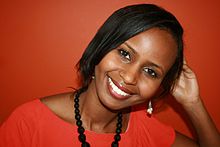Nadifa Mohamed
Nadifa Mohamed نادئفا محمد | |
|---|---|
 | |
| Born | Nadiifa Maxamed 1981 (age 43–44) |
| Nationality | British |
| Alma mater | University of Oxford |
| Occupation | novelist |
| Movement | Realism, Historical fiction |
Nadifa Mohamed (Template:Lang-so, Template:Lang-ar) (born 1981 in Hargeisa, Somalia) is a Somali-British novelist.
Personal life
Mohamed was born in 1981 in Hargeisa, Somalia.[1] Her father was a sailor in the merchant navy and her mother was a local landlady.[2] In 1986, she moved with her family to London for what was intended to be a temporary stay. However, the civil war broke out shortly afterwards in Somalia, so they remained in the UK.[3]
Mohamed later attended the University of Oxford, where she studied history and politics. In 2008, she visited Hargeisa for the first time in over a decade.[3]
Mohamed presently resides in London and is working on her third novel.[3]
Literary career
Mohamed's first novel, Black Mamba Boy (2009), is a semi-biographical account of her father's life in Yemen in the 1930s and '40s, during the colonial period.[4][5] Mohamed has said: "The novel grew out of a desire to learn more about my roots, to elucidate Somali history for a wider audience and to tell a story that I found fascinating."[2] It won the 2010 Betty Trask Award, and was shortlisted for numerous awards, including the 2010 Guardian First Book Award,[6] the 2010 Dylan Thomas Prize,[7] and the 2010 John Llewellyn Rhys Prize.[8] The book was also long-listed for the 2010 Orange Prize for Fiction.[9]
In 2013, Mohamed released her second novel, The Orchard of Lost Souls.[10] Set in Somalia on the eve of the civil war, it was published by Simon & Schuster.[11] Reviewing it in The Independent, Arifa Akbar said: "If Mohamed's first novel was about fathers and sons ... this one is essentially about mothers and daughters."[12]
Awards
- 2010 Betty Trask Prize, Black Mamba Boy[13]
- 2013 Granta "Best of Young British Novelists"[14]
Works
- Black Mamba Boy (2009)
- The Orchard of Lost Souls (2013)
References
- ^ Nadifa Mohamed, HarperCollins Author Profile
- ^ a b "WDN Interview with Nadifa Mohamed: The Author of Black Mamba Boy", WardheerNews, 21 April 2011.
- ^ a b c "Nadifa Mohamed". Simon and Schuster. Retrieved 26 August 2013.
- ^ "Black Mamba Boy, By Nadifa Mohamed", reviewed by Arifa Akbar, The Independent, 15 January 2010.
- ^ Hassan M. Abukar, "Black Mamba Boy: A Book Review", WardheerNews, 30 October 2010.
- ^ "Guardian first book award shortlist revealed", The Guardian, 29 October 2010
- ^ "Somali author Nadifa Mohamed up for first book prize", BBC, 28 October 2010.
- ^ "Shortlist announced for the John Llewellyn Rhys Prize 2010". BookTrust. Archived from the original on November 27, 2010.
- ^ Black Mamba Boy, Orange Prize for Fiction.
- ^ Maya Jaggi, "The Orchard of Lost Souls by Nadifa Mohamed – review. The Betty Trask award winner takes on a complex history of Somalian civil unrest with a focus on women", The Guardian, 14 September 2013.
- ^ "The Orchard of Lost Souls". The Lady. Retrieved 26 August 2013.
{{cite web}}: Italic or bold markup not allowed in:|publisher=(help) - ^ Arifa Akbar, "Book review: The Orchard of Lost Souls, By Nadifa Mohamed", The Independent, 16 August 2013.
- ^ Richard Lea (27 August 2010). "Guardian first book award longlist ranges around the world". The Guardian. Retrieved May 31, 2013.
- ^ Annalisa Quinn (April 15, 2013). "Granta's 'Best Of Young British Novelists' Shows A 'Disunited Kingdom'". Granta. Retrieved April 15, 2013.
External links
- "WDN Interview with Nadifa Mohamed: The Author of Black Mamba Boy", WardheerNews, 21 April 2011.
- "Black Mamba Boy - Nadifa Mohamed" on YouTube.
- Nadifa Mohamed on Somali Writers, Asymptote.
- Nadifa Mohamed interviewed by Stacey Knecht for www.the-ledge.com
- Magnus Taylor, "An interview with Nadifa Mohamed: 'I don’t feel bound by Somalia…but the stories that have really motivated me are from there'", African Arguments, 1 November 2013.
- "Nadifa Mohamed: The Granta Podcast, Ep. 71", 22 May 2013.
- Granta Video: Nadifa Mohamed, 11 June 2013.
